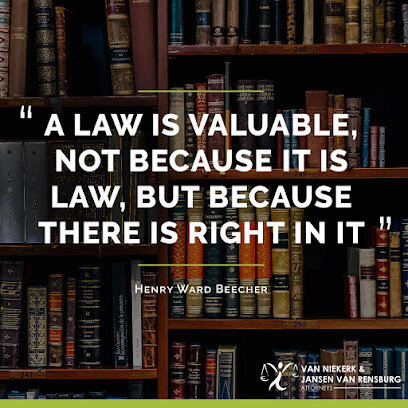Best State, Local, and Municipal Law Lawyers in South Africa
Share your needs with us, get contacted by law firms.
Free. Takes 2 min.
Or refine your search by selecting a city:
List of the best lawyers in South Africa
About State, Local, and Municipal Law in South Africa
State, Local, and Municipal Law in South Africa governs the role and responsibilities of local governments and municipalities. This field of law is essential for the administration of cities and towns, ensuring that public services are delivered efficiently and according to regulations. It encompasses a broad range of issues including zoning, land use, public finance, municipal elections, public health, and safety. The South African Constitution recognizes municipalities as an independent sphere of government, empowering them to govern on their own initiatives and manage local affairs. This framework is supported by various laws, including the Municipal Systems Act, Municipal Structures Act, and the Municipal Finance Management Act.
Why You May Need a Lawyer
Individuals and businesses may need legal assistance in the field of State, Local, and Municipal Law for several reasons. Common situations include disputes over zoning and land use, navigating the complexities of obtaining permits or licenses, and addressing matters of property taxes and assessments. Citizens may also seek legal help to ensure compliance with local bylaws or to address grievances regarding municipal services. Businesses might require assistance negotiating with local authorities or understanding their rights and obligations under municipal regulations. Furthermore, involvement in public procurement processes or municipal infrastructure projects often necessitates experienced legal guidance.
Local Laws Overview
Local laws in South Africa are derived from both national legislation and provincial frameworks, providing municipalities with the authority to regulate a variety of public and governmental activities. Key aspects include:
- Municipal Governance: The organization and oversight of municipal councils, including their executive, legislative, and administrative functions.
- Land Use Management: Regulations regarding zoning, building codes, and land development, which municipalities govern to shape urban development and manage resources.
- Public Health and Safety: Enforcing standards to protect the health and safety of residents, including sanitation services and health inspections.
- Municipal Finance: Managing public funds through budgeting, financial planning, and audits to ensure accountability and sustainability.
- Service Delivery: Providing and regulating essential services such as waste management, water supply, and electricity within municipal boundaries.
Frequently Asked Questions
What is the role of municipality in South Africa?
Municipalities are responsible for local governance, service delivery, and implementing provincial and national policies at the local level.
What legal framework governs municipalities in South Africa?
Municipalities are primarily governed by the Constitution of South Africa, the Local Government: Municipal Structures Act, the Municipal Systems Act, and the Municipal Finance Management Act.
How can I dispute a property tax assessment?
You can challenge a property tax assessment by filing an objection with your local municipality, and, if necessary, appealing their decision through a Valuation Appeal Board.
What should I do if I disagree with a zoning decision?
You may lodge an appeal with the relevant municipal tribunal or seek judicial review in a court of law.
How are municipal rates determined?
Municipal rates are based on the market value of a property and are set by municipal councils in accordance with local policies and budgetary needs.
Can I attend municipal council meetings?
Yes, municipal council meetings are typically open to the public, but it may be necessary to register your interest in advance depending on the council’s procedures.
Who can make decisions at the local government level?
Decisions at the local government level are made by elected council members and their appointed officials based on delegated authority and prescribed processes.
How do I obtain a building permit?
Building permits are obtained by submitting an application with detailed plans to your local municipal planning department for review and approval.
What services are municipalities responsible for?
Municipalities are responsible for a wide range of services, including water and sanitation, electricity distribution, waste management, and local economic development initiatives.
How can I participate in local municipal planning?
Public participation is encouraged through scheduled consultations, council meetings, and submissions during public commentary periods for proposed developments and policies.
Additional Resources
For more information or assistance, consider the following resources:
- South African Local Government Association (SALGA): Provides support and advocacy for municipalities.
- Department of Cooperative Governance and Traditional Affairs: Oversees local government operations in South Africa.
- Municipal Demarcation Board: Responsible for defining municipal boundaries and resolving disputes.
- Independent Regulatory Board for Auditors (IRBA): Offers guidance on municipal audits and financial compliance.
- Local Municipal Offices: Your first point of contact for local governance issues and service-related inquiries.
Next Steps
If you need legal assistance in the area of State, Local, and Municipal Law in South Africa, consider these steps:
- Identify the specific legal issue you are facing and gather all relevant documentation.
- Research legal professionals or law firms specializing in local government and municipal law.
- Contact a lawyer to discuss your situation and explore potential solutions.
- Consider attending public forums or consultations to gain insights into local governance.
- Utilize available resources, such as your local municipality, for additional information and guidance.
Lawzana helps you find the best lawyers and law firms in South Africa through a curated and pre-screened list of qualified legal professionals. Our platform offers rankings and detailed profiles of attorneys and law firms, allowing you to compare based on practice areas, including State, Local, and Municipal Law, experience, and client feedback.
Each profile includes a description of the firm's areas of practice, client reviews, team members and partners, year of establishment, spoken languages, office locations, contact information, social media presence, and any published articles or resources. Most firms on our platform speak English and are experienced in both local and international legal matters.
Get a quote from top-rated law firms in South Africa — quickly, securely, and without unnecessary hassle.
Disclaimer:
The information provided on this page is for general informational purposes only and does not constitute legal advice. While we strive to ensure the accuracy and relevance of the content, legal information may change over time, and interpretations of the law can vary. You should always consult with a qualified legal professional for advice specific to your situation.
We disclaim all liability for actions taken or not taken based on the content of this page. If you believe any information is incorrect or outdated, please contact us, and we will review and update it where appropriate.
Browse state, local, and municipal law law firms by city in South Africa
Refine your search by selecting a city.















